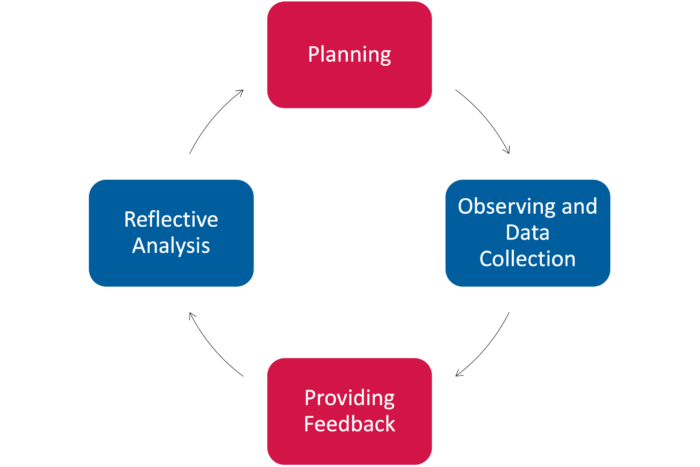Peer Mentoring
Peer mentoring is a collaborative and supportive relationship in which experienced faculty (peer mentors) provide guidance, encouragement, and resources to newer faculty and seasoned faculty that are taking on a new role at the college. Peer mentoring can enhance faculty success by fostering a sense of belonging and promoting personal growth. Benefit to mentees include increased teaching confidence and higher career satisfaction. Benefits to mentors include a renewed interest in their own work, an increased sense of accomplishment, and opportunities to hear new ideas. In addition to informal mentorship, there are programs at MCC that integrate peer mentoring among faculty.
Peer Assistance and Review Process (PAR)
Peer mentorship is a substantial part of the faculty onboarding experience via the Peer Assistance and Review (PAR) process, which is “intended to provide significant professional growth and development for the Probationary Faculty member in an environment of support and encouragement” (RFA 17.1). Appointive faculty are eligible to serve as a PAR mentor. Mentorship is a valuable service to the college in addition to its importance to our faculty; as such, mentorship can be used toward satisfaction of the Service requirement of the Faculty Evaluation Plan (FEP).
Complete this form to indicate your interest in being a faculty mentor as part of the PAR process.
Mentorship Outcomes
According to Wai-Ling Packard (2015), knowing what you want to achieve will help you to think about the mentorship. Typical mentee outcomes include
- increased confidence in one’s abilities (self-efficacy)
- greater knowledge or competence [such as student engagement techniques or assessment practices]
- greater sense of belonging or connection to the field [or college]
- persistence or advancement in one’s career path (Wai-Ling Packard, 2015, pp. 29-30)
A helpful exercise for mentors is making a list of primary obstacles that mentees experience and setting mentorship goals to address them. See the table below as an example.
| Primary Obstacle | Mentorship Goal |
| Limited knowledge about the resources that are available to support student success | Broaden faculty knowledge about tutoring services, Mesa Market, TRiO program, multicultural services, undergraduate research, etc |
| Need for sense of belonging in department or among peers in a new role | Increase connections to people in the department or in a similar role |
Be intentional about the activities and resources that will improve the mentorship experience (Wai-Ling Packard, 2015, pp. 53).
Reciprocal Peer Mentoring
It is evident that mentoring may have mutually positive effects for both the mentor and the mentee and in terms of learning these individuals may be ‘co-learners’ (Chandler & Kram, 2005). Reciprocal Peer Mentoring (RPM) focuses on collegial effort to advance professional development and relies on a non-evaluative approach to mentoring (Vidmar, 2006). One way to engage in RPM is through the cyclical process below.

In addition to selecting their mentor partner, RPM establishes a reasonable cadence to learn from one another. When the cycle is applied to teaching, the cycle reflects the steps below.
- Peers meet before teaching to share plans and set a goal for teaching.
- One of the peers observes and collects data about the performance of the other peer who is actively teaching.
- Peers meet following the teaching to make a reflective analysis and exchange feedback as a way to improve one another’s effectiveness (Joyce & Showers, 1980).
In addition to applying the RPM model to mentorship experiences between seasoned and new faculty, this process may be a beneficial to faculty partners in similar career phases.
Booklist for Peer Mentors
Do you have a book recommendation? Contact the CTL and we will add it to this list: ctl@mesacc.edu

Dare to Lead: Brave Work. Tough Conversations. Whole Hearts.
Author: Brené Brown
Publisher: Random House, 2018
This book reveals how a leader is anyone who takes on the responsibility for recognizing the potential in people and ideas, and has the courage to develop that potential.

Mindset: The New Psychology of Success
Author: Carol Dweck
Publisher: Ballantine Books, 2007
Discover ideas about success in work and other aspects of life that are influenced by the ways we think about our talents and abilities.

Successful STEM Mentoring Initiatives for Underrepresented Students
Author: Becky Wai-Ling Packard
Publisher: Routledge, 1st Edition, 2015
Although this book is written about student mentoring, the concepts may be applied to faculty peer mentoring.

Switch: How to Change Things When Change is Hard
Authors: Chip Heath and Dan Heath
Publisher: Crown Currency, 1st Edition, 2010
This book describes the rational and emotional mind and uses real stories to offer suggestions to achieve results.

Thanks for the Feedback The Science and Art of Receiving Feedback Well
Authors: Douglas Stone & Shiela Heen
Publisher: Penguin Books, 2015
Explore why feedback is so crucial yet challenging and apply a simple framework to absorb feedback with curiosity and grace.
